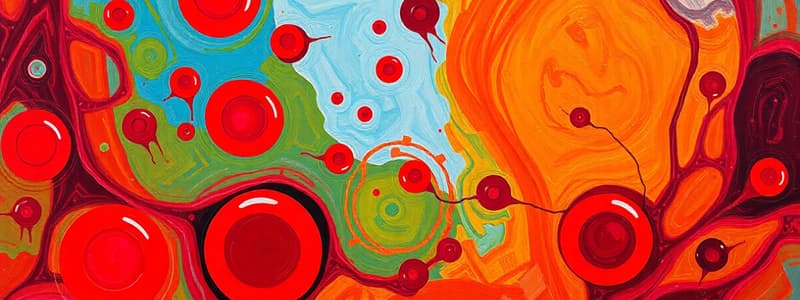Podcast
Questions and Answers
What is the primary function of albumin in blood plasma?
What is the primary function of albumin in blood plasma?
- Transporting oxygen
- Fighting infections
- Maintaining colloid osmotic pressure (correct)
- Clotting blood
How does the life span of erythrocytes differ between species?
How does the life span of erythrocytes differ between species?
- Erythrocyte life spans are universally 90 days across all species.
- The average life span of mammalian erythrocytes is generally around 120 days. (correct)
- Erythrocytes of reptiles have the longest life span.
- Mammalian erythrocytes live longer than those of birds.
What is a key structural feature of avian erythrocytes?
What is a key structural feature of avian erythrocytes?
- They possess an oval nucleus, unlike mammalian erythrocytes. (correct)
- They are smaller than mammalian erythrocytes.
- They are biconcave in shape with a central pallor.
- They are anucleate like mammalian erythrocytes.
Which type of white blood cell is most abundant in healthy human blood?
Which type of white blood cell is most abundant in healthy human blood?
What distinguishes granulocytes from agranulocytes?
What distinguishes granulocytes from agranulocytes?
What is the function of fibrinogen in blood?
What is the function of fibrinogen in blood?
How are erythrocytes in horses characterized?
How are erythrocytes in horses characterized?
What components are primarily found in the plasma of blood?
What components are primarily found in the plasma of blood?
What type of leukocyte is indicated by the presence of multilobed nuclei?
What type of leukocyte is indicated by the presence of multilobed nuclei?
What is the primary role of globulins in blood plasma?
What is the primary role of globulins in blood plasma?
Flashcards are hidden until you start studying
Study Notes
Blood
- Blood, a fluid connective tissue, circulates through the cardiovascular system.
- Consists of plasma and formed elements (white blood cells, red blood cells, platelets).
- Plasma is a protein-rich liquid extracellular matrix.
- Plasma proteins include albumin (responsible for colloid osmotic pressure), globulins (immunoglobulins and nonimmune globulins), and fibrinogen (blood clotting).
- Serum is plasma without clotting factors.
Erythrocytes (Red Blood Cells)
- Erythrocytes are anucleate, biconcave discs packed with hemoglobin for O2 and CO2 transport.
- Their lifespan is about 120 days.
- Hemoglobin is a protein composed of four globin chains with iron-containing heme groups for binding, transporting, and releasing O2 and CO2.
- Chicken erythrocytes are unique, being large, elongated, oval-nucleated cells.
- Their size varies depending on the breed and sex of the bird.
Erythrocyte Variation
- Canine erythrocytes are large (7 μm), uniform in size with central pallor.
- Equine erythrocytes exhibit rouleaux formation, characterized by stacked coin-like arrangements.
- Canine erythrocytes have an average diameter of 5.7 μm and are uniform in size without central pallor.
- Avian, amphibian, and fish erythrocytes are large, elongated, flat cells with an oval nucleus.
Leukocytes (White Blood Cells)
- Leukocytes are classified into granulocytes (neutrophils, eosinophils, basophils) and agranulocytes (lymphocytes, monocytes) based on the presence or absence of specific granules in their cytoplasm.
Granulocytes
- Neutrophils (47-67% of leukocytes) have multilobed nuclei and specific granules containing enzymes, complement activators, and antimicrobial peptides.
- These granules help to destroy microorganisms at sites of inflammation.
- Pus, a yellow-white exudate, forms at infection sites.
Studying That Suits You
Use AI to generate personalized quizzes and flashcards to suit your learning preferences.




